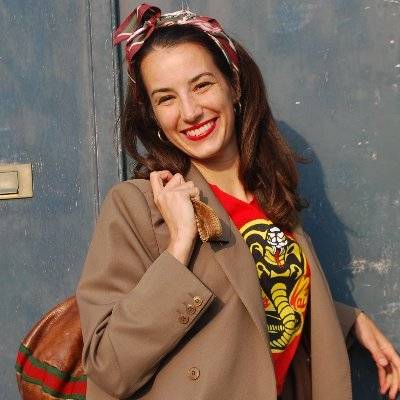For multimedia artist Steve Sabella, these hard times require us to access the potential of our imagination in order to conjure up our collective future. His works of art reflecting the hardships of the Palestinians become universal metaphors for global rebirth.
“We are in the era of something new,” says the Palestinian artist. “Of change, opportunity, creativity, imagination. So we must bid farewell to the age of war and hatred. In the post-coronavirus apocalypse, any leader in the world who does not endorse pure awareness to protect the planet first, followed by equal welfare for all its citizens, will eventually have no chance.”
When the Covid-19 crisis hit, the artist was about to put up for auction his six metre-wide photographic triptych called “No Man’s Land” at Sotheby’s, donating all of the proceeds to Birzeit’s Palestinian Museum Education Programme.
![No Man’s Land 2015 [Image provided by Naima Morelli]](https://i0.wp.com/www.middleeastmonitor.com/wp-content/uploads/2020/04/no-mans-land-2015-e1585929024185-796x800.jpg?resize=796%2C800&ssl=1)
No Man’s Land 2015 [Image provided by Naima Morelli]
READ: Palestine’s recent history through political landscape posters
“In many ways, this is the physical and mental state that many Palestinians live in, even those who remained on the land,” says the artist, who was originally inspired for the work by the condition of his co-nationals. “And now, this is a reality that might hit all people with the blink of an eye.”
As always in Sabella’s work, hope counters the darkest aspects: “This piece [“No Man’s Land”] inspires us to imagine the beauty of our world and see beyond its surface, especially today when everything is in flux.”
The artist, now based in Berlin, was born in Jerusalem’s Old City and remained there until 2007. Back then, he felt in exile while being at home: “I experienced first-hand how the Israeli occupation paralyses and controls the body. I felt the extreme psychological impact of what it means to be born under occupation, and live later a trapped reality.”
In his body of work a recurring theme is indeed the “Colonised Imagination”. This is based on the observation that many Palestinians have reached a point where they cannot even imagine living in freedom, let alone liberate their land.
![The sound of Jerusalem 2020 [Image provided by Naima Morelli]](https://i0.wp.com/www.middleeastmonitor.com/wp-content/uploads/2020/04/the-sound-of-jerusalem-2020-scaled-e1585928993677.jpg?resize=920%2C216&ssl=1)
The sound of Jerusalem 2020 [Image provided by Naima Morelli]
While living abroad, Sabella has always maintained strong ties with the art scene in Palestine. He had 11 solos on the ground between 1998 and 2007. After he left Jerusalem he started considering himself as an ambassador for his origins. It’s a role that he regards as particularly suitable for artists.
READ: One Palestinian group is running to restore freedom of movement
“Artists are the most equipped to feel the pulse of nations, and later transform these vibrations into great art, art without identity, so that everyone can identify with it,” he notes. “Only such art can survive the pages of time.”
He has many ideas about how to set Palestinian art in high motion, increase its value and bring it to international attention via different validation routes. He has started planning partnerships with local Palestinian influencers to create a sustainable corporate art collection in Palestine. Knowing that the times coming will be economically tough, he’s aware that this is a time for synergy.
“It should always be remembered that the crash is in the monetary value, not in art’s intrinsic value, even though there is a correlation.” Sabella is aware that artists will pay a huge price, but does not see them becoming less creative by any means. “The time has come for clarity and for cleansing and for all creatives to become super creatives.”
READ: ‘Radical’ in Ramallah, the Palestinian skateboard scene
The Palestinian exile feels strongly, because the role of the artist in the disruption of the world as we know it is to imagine and create this new reality together. “The time has come to stop drawing borders and start drawing our future. And the future is now. We are all interconnected, part of a much larger picture. We must inject into ourselves the image of a better world, and this time not having it as just as a utopia. We are in the era of the essence, of hard work, like never before.”
Sabella is working hard himself, having created in the last few weeks what he usually produces in five years: “I believe that as long as you do what you love, the universe will always carry you. And maybe I was feeling the urgency to create a body of work on the essence of life and being.”
Whether it’s a painting, an installation, writing or photography, all of Sabella’s creations derive from an intense focus. He works by eliminating all clutter, noise and distortion, to get to an inward journey in search of what he calls “the minerals of our essence. Our soul. And because the soul does not like to be lied to, I quickly learned to be honest with myself and not waste time processing superficial things.”
From these reflections stemmed his new series of artworks called “Everland”, “Endless”, “A Short Story”, “Palestine UNSETTLED”, “The Sound of Jerusalem” and his newest book, The Secrets of Life. The artwork “Everland”, in particular, celebrates all the beauty that comes out of Palestine, and is based on the pictures of embroidery he took during his past travels.
“To be born in Jerusalem or anywhere else,” he concludes, “always means that you are becoming a citizen of planet Earth. We are all from everywhere and nowhere. Poetically, we are all from elsewhere! And that nowhere is the ‘everland’ that we are all searching for. The ground we are looking for is right there under our feet.”

![Palestinian artist Steve Sabella [Image provided by Naima Morelli]](https://i0.wp.com/www.middleeastmonitor.com/wp-content/uploads/2020/04/Palestinian-artist-Steve-Sabella.jpg?fit=920%2C613&ssl=1)

![Mockups Design Palestine UNSETTLED 2020 [Image provided by Naima Morelli]](https://i0.wp.com/www.middleeastmonitor.com/wp-content/uploads/2020/04/Palestine-UNSETTLED-2020.jpg?w=649&h=474&ssl=1)
![independence-2013 [Image provided by Naima Morelli]](https://i0.wp.com/www.middleeastmonitor.com/wp-content/uploads/2020/04/independence-2013-scaled-e1585929046333.jpg?w=263&h=474&ssl=1)
![no-mans-land-2015 No Man’s Land 2015 [Image provided by Naima Morelli]](https://i0.wp.com/www.middleeastmonitor.com/wp-content/uploads/2020/04/no-mans-land-2015-e1585929024185.jpg?w=458&h=460&ssl=1)
![everland-2020 Everland 2020 [Image provided by Naima Morelli]](https://i0.wp.com/www.middleeastmonitor.com/wp-content/uploads/2020/04/everland-2020-scaled-e1585929064629.jpg?w=454&h=460&ssl=1)
![endless-2020 Endless 2020 [Image provided by Naima Morelli]](https://i0.wp.com/www.middleeastmonitor.com/wp-content/uploads/2020/04/endless-2020-scaled-e1585929084884.jpg?w=916&h=434&ssl=1)






